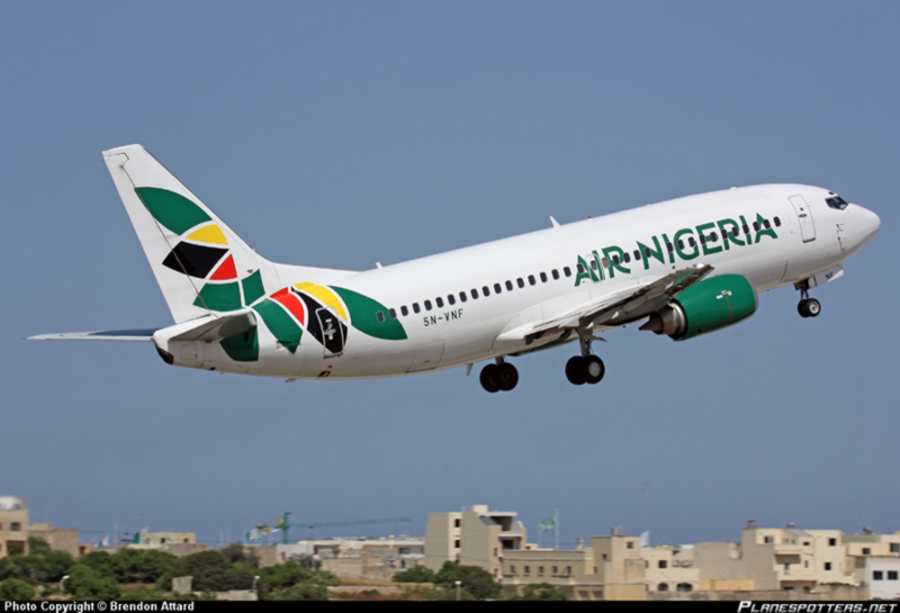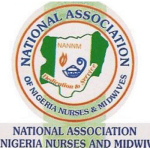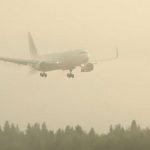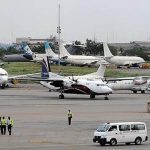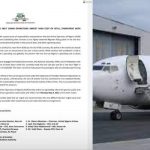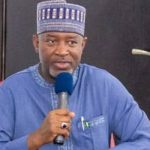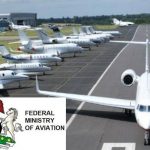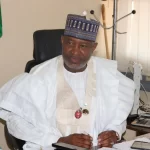 The Airline Operators of Nigeria has appealed to the Federal Government to urgently intervene in making foreign exchange available for its members, following the threat by Lloyd’s of London to blacklist the country.
The Airline Operators of Nigeria has appealed to the Federal Government to urgently intervene in making foreign exchange available for its members, following the threat by Lloyd’s of London to blacklist the country.
Lilian Eze-Mark reports that the AON chairman has called on Minister of State, Aviation, Hadi Sirika , to as a matter of urgency, come to the aid of domestic airlines operating in the country.
He called for a joint working group with the Federal Ministry of Finance and the Central Bank of Nigeria to forestall a potential backlash on the Nigerian economy.
Lloyd’s, the world’s leading insurance market, had issued a warning to Nigerian airline operators that it might be forced to blacklist the country in the face of continued failure of some operators to pay their premiums regularly.
The company’s representatives, who were in Nigeria recently, had noted that the Nigerian market was a high risk market with the volume of business modestly small and airline brokers not paying their premiums.
To this end, they cautioned that in view of the fact that airlines brokers in Nigeria had in recent times failed to pay their premiums, the Lloyd’s market might have no other choice than to blacklist the country.
Meggisson is afraid the development might have far-reaching consequences for the aviation industry and the country.
He claimed that the airlines had naira but could not pay premiums because of constraints in foreign exchange.
According to him, Lloyd’s market accounts for about 92 per cent of reinsurance of airlines globally.
He regretted that the Nigerian market is grossly unable to effectively underwrite risks in aviation because of the high exposure of an average of 500 million dollars for just one airplane to cover hull, war and third party liability.
Meggison said when the figure is multiplied by the number of aircraft operating in the country it becomes clear that Nigerian insurance companies cannot cope with the enormous volume of resources needed to cover all the aircraft which the total value will be in excess of six billion dollars.
Meanwhile Nigerian Civil Aviation Authority has warned that no person shall operate any aircraft in public air transport category without adequate or valid insurance certificate in the country.
 The Airline Operators of Nigeria has appealed to the Federal Government to urgently intervene in making foreign exchange available for its members, following the threat by Lloyd’s of London to blacklist the country.
The Airline Operators of Nigeria has appealed to the Federal Government to urgently intervene in making foreign exchange available for its members, following the threat by Lloyd’s of London to blacklist the country.
Lilian Eze-Mark reports that the AON chairman has called on Minister of State, Aviation, Hadi Sirika , to as a matter of urgency, come to the aid of domestic airlines operating in the country.
He called for a joint working group with the Federal Ministry of Finance and the Central Bank of Nigeria to forestall a potential backlash on the Nigerian economy.
Lloyd’s, the world’s leading insurance market, had issued a warning to Nigerian airline operators that it might be forced to blacklist the country in the face of continued failure of some operators to pay their premiums regularly.
The company’s representatives, who were in Nigeria recently, had noted that the Nigerian market was a high risk market with the volume of business modestly small and airline brokers not paying their premiums.
To this end, they cautioned that in view of the fact that airlines brokers in Nigeria had in recent times failed to pay their premiums, the Lloyd’s market might have no other choice than to blacklist the country.
Meggisson is afraid the development might have far-reaching consequences for the aviation industry and the country.
He claimed that the airlines had naira but could not pay premiums because of constraints in foreign exchange.
According to him, Lloyd’s market accounts for about 92 per cent of reinsurance of airlines globally.
He regretted that the Nigerian market is grossly unable to effectively underwrite risks in aviation because of the high exposure of an average of 500 million dollars for just one airplane to cover hull, war and third party liability.
Meggison said when the figure is multiplied by the number of aircraft operating in the country it becomes clear that Nigerian insurance companies cannot cope with the enormous volume of resources needed to cover all the aircraft which the total value will be in excess of six billion dollars.
Meanwhile Nigerian Civil Aviation Authority has warned that no person shall operate any aircraft in public air transport category without adequate or valid insurance certificate in the country.
 The Airline Operators of Nigeria has appealed to the Federal Government to urgently intervene in making foreign exchange available for its members, following the threat by Lloyd’s of London to blacklist the country.
The Airline Operators of Nigeria has appealed to the Federal Government to urgently intervene in making foreign exchange available for its members, following the threat by Lloyd’s of London to blacklist the country.
Lilian Eze-Mark reports that the AON chairman has called on Minister of State, Aviation, Hadi Sirika , to as a matter of urgency, come to the aid of domestic airlines operating in the country.
He called for a joint working group with the Federal Ministry of Finance and the Central Bank of Nigeria to forestall a potential backlash on the Nigerian economy.
Lloyd’s, the world’s leading insurance market, had issued a warning to Nigerian airline operators that it might be forced to blacklist the country in the face of continued failure of some operators to pay their premiums regularly.
The company’s representatives, who were in Nigeria recently, had noted that the Nigerian market was a high risk market with the volume of business modestly small and airline brokers not paying their premiums.
To this end, they cautioned that in view of the fact that airlines brokers in Nigeria had in recent times failed to pay their premiums, the Lloyd’s market might have no other choice than to blacklist the country.
Meggisson is afraid the development might have far-reaching consequences for the aviation industry and the country.
He claimed that the airlines had naira but could not pay premiums because of constraints in foreign exchange.
According to him, Lloyd’s market accounts for about 92 per cent of reinsurance of airlines globally.
He regretted that the Nigerian market is grossly unable to effectively underwrite risks in aviation because of the high exposure of an average of 500 million dollars for just one airplane to cover hull, war and third party liability.
Meggison said when the figure is multiplied by the number of aircraft operating in the country it becomes clear that Nigerian insurance companies cannot cope with the enormous volume of resources needed to cover all the aircraft which the total value will be in excess of six billion dollars.
Meanwhile Nigerian Civil Aviation Authority has warned that no person shall operate any aircraft in public air transport category without adequate or valid insurance certificate in the country.
 The Airline Operators of Nigeria has appealed to the Federal Government to urgently intervene in making foreign exchange available for its members, following the threat by Lloyd’s of London to blacklist the country.
The Airline Operators of Nigeria has appealed to the Federal Government to urgently intervene in making foreign exchange available for its members, following the threat by Lloyd’s of London to blacklist the country.
Lilian Eze-Mark reports that the AON chairman has called on Minister of State, Aviation, Hadi Sirika , to as a matter of urgency, come to the aid of domestic airlines operating in the country.
He called for a joint working group with the Federal Ministry of Finance and the Central Bank of Nigeria to forestall a potential backlash on the Nigerian economy.
Lloyd’s, the world’s leading insurance market, had issued a warning to Nigerian airline operators that it might be forced to blacklist the country in the face of continued failure of some operators to pay their premiums regularly.
The company’s representatives, who were in Nigeria recently, had noted that the Nigerian market was a high risk market with the volume of business modestly small and airline brokers not paying their premiums.
To this end, they cautioned that in view of the fact that airlines brokers in Nigeria had in recent times failed to pay their premiums, the Lloyd’s market might have no other choice than to blacklist the country.
Meggisson is afraid the development might have far-reaching consequences for the aviation industry and the country.
He claimed that the airlines had naira but could not pay premiums because of constraints in foreign exchange.
According to him, Lloyd’s market accounts for about 92 per cent of reinsurance of airlines globally.
He regretted that the Nigerian market is grossly unable to effectively underwrite risks in aviation because of the high exposure of an average of 500 million dollars for just one airplane to cover hull, war and third party liability.
Meggison said when the figure is multiplied by the number of aircraft operating in the country it becomes clear that Nigerian insurance companies cannot cope with the enormous volume of resources needed to cover all the aircraft which the total value will be in excess of six billion dollars.
Meanwhile Nigerian Civil Aviation Authority has warned that no person shall operate any aircraft in public air transport category without adequate or valid insurance certificate in the country.
 The Airline Operators of Nigeria has appealed to the Federal Government to urgently intervene in making foreign exchange available for its members, following the threat by Lloyd’s of London to blacklist the country.
The Airline Operators of Nigeria has appealed to the Federal Government to urgently intervene in making foreign exchange available for its members, following the threat by Lloyd’s of London to blacklist the country.
Lilian Eze-Mark reports that the AON chairman has called on Minister of State, Aviation, Hadi Sirika , to as a matter of urgency, come to the aid of domestic airlines operating in the country.
He called for a joint working group with the Federal Ministry of Finance and the Central Bank of Nigeria to forestall a potential backlash on the Nigerian economy.
Lloyd’s, the world’s leading insurance market, had issued a warning to Nigerian airline operators that it might be forced to blacklist the country in the face of continued failure of some operators to pay their premiums regularly.
The company’s representatives, who were in Nigeria recently, had noted that the Nigerian market was a high risk market with the volume of business modestly small and airline brokers not paying their premiums.
To this end, they cautioned that in view of the fact that airlines brokers in Nigeria had in recent times failed to pay their premiums, the Lloyd’s market might have no other choice than to blacklist the country.
Meggisson is afraid the development might have far-reaching consequences for the aviation industry and the country.
He claimed that the airlines had naira but could not pay premiums because of constraints in foreign exchange.
According to him, Lloyd’s market accounts for about 92 per cent of reinsurance of airlines globally.
He regretted that the Nigerian market is grossly unable to effectively underwrite risks in aviation because of the high exposure of an average of 500 million dollars for just one airplane to cover hull, war and third party liability.
Meggison said when the figure is multiplied by the number of aircraft operating in the country it becomes clear that Nigerian insurance companies cannot cope with the enormous volume of resources needed to cover all the aircraft which the total value will be in excess of six billion dollars.
Meanwhile Nigerian Civil Aviation Authority has warned that no person shall operate any aircraft in public air transport category without adequate or valid insurance certificate in the country.
 The Airline Operators of Nigeria has appealed to the Federal Government to urgently intervene in making foreign exchange available for its members, following the threat by Lloyd’s of London to blacklist the country.
The Airline Operators of Nigeria has appealed to the Federal Government to urgently intervene in making foreign exchange available for its members, following the threat by Lloyd’s of London to blacklist the country.
Lilian Eze-Mark reports that the AON chairman has called on Minister of State, Aviation, Hadi Sirika , to as a matter of urgency, come to the aid of domestic airlines operating in the country.
He called for a joint working group with the Federal Ministry of Finance and the Central Bank of Nigeria to forestall a potential backlash on the Nigerian economy.
Lloyd’s, the world’s leading insurance market, had issued a warning to Nigerian airline operators that it might be forced to blacklist the country in the face of continued failure of some operators to pay their premiums regularly.
The company’s representatives, who were in Nigeria recently, had noted that the Nigerian market was a high risk market with the volume of business modestly small and airline brokers not paying their premiums.
To this end, they cautioned that in view of the fact that airlines brokers in Nigeria had in recent times failed to pay their premiums, the Lloyd’s market might have no other choice than to blacklist the country.
Meggisson is afraid the development might have far-reaching consequences for the aviation industry and the country.
He claimed that the airlines had naira but could not pay premiums because of constraints in foreign exchange.
According to him, Lloyd’s market accounts for about 92 per cent of reinsurance of airlines globally.
He regretted that the Nigerian market is grossly unable to effectively underwrite risks in aviation because of the high exposure of an average of 500 million dollars for just one airplane to cover hull, war and third party liability.
Meggison said when the figure is multiplied by the number of aircraft operating in the country it becomes clear that Nigerian insurance companies cannot cope with the enormous volume of resources needed to cover all the aircraft which the total value will be in excess of six billion dollars.
Meanwhile Nigerian Civil Aviation Authority has warned that no person shall operate any aircraft in public air transport category without adequate or valid insurance certificate in the country.
 The Airline Operators of Nigeria has appealed to the Federal Government to urgently intervene in making foreign exchange available for its members, following the threat by Lloyd’s of London to blacklist the country.
The Airline Operators of Nigeria has appealed to the Federal Government to urgently intervene in making foreign exchange available for its members, following the threat by Lloyd’s of London to blacklist the country.
Lilian Eze-Mark reports that the AON chairman has called on Minister of State, Aviation, Hadi Sirika , to as a matter of urgency, come to the aid of domestic airlines operating in the country.
He called for a joint working group with the Federal Ministry of Finance and the Central Bank of Nigeria to forestall a potential backlash on the Nigerian economy.
Lloyd’s, the world’s leading insurance market, had issued a warning to Nigerian airline operators that it might be forced to blacklist the country in the face of continued failure of some operators to pay their premiums regularly.
The company’s representatives, who were in Nigeria recently, had noted that the Nigerian market was a high risk market with the volume of business modestly small and airline brokers not paying their premiums.
To this end, they cautioned that in view of the fact that airlines brokers in Nigeria had in recent times failed to pay their premiums, the Lloyd’s market might have no other choice than to blacklist the country.
Meggisson is afraid the development might have far-reaching consequences for the aviation industry and the country.
He claimed that the airlines had naira but could not pay premiums because of constraints in foreign exchange.
According to him, Lloyd’s market accounts for about 92 per cent of reinsurance of airlines globally.
He regretted that the Nigerian market is grossly unable to effectively underwrite risks in aviation because of the high exposure of an average of 500 million dollars for just one airplane to cover hull, war and third party liability.
Meggison said when the figure is multiplied by the number of aircraft operating in the country it becomes clear that Nigerian insurance companies cannot cope with the enormous volume of resources needed to cover all the aircraft which the total value will be in excess of six billion dollars.
Meanwhile Nigerian Civil Aviation Authority has warned that no person shall operate any aircraft in public air transport category without adequate or valid insurance certificate in the country.
 The Airline Operators of Nigeria has appealed to the Federal Government to urgently intervene in making foreign exchange available for its members, following the threat by Lloyd’s of London to blacklist the country.
The Airline Operators of Nigeria has appealed to the Federal Government to urgently intervene in making foreign exchange available for its members, following the threat by Lloyd’s of London to blacklist the country.
Lilian Eze-Mark reports that the AON chairman has called on Minister of State, Aviation, Hadi Sirika , to as a matter of urgency, come to the aid of domestic airlines operating in the country.
He called for a joint working group with the Federal Ministry of Finance and the Central Bank of Nigeria to forestall a potential backlash on the Nigerian economy.
Lloyd’s, the world’s leading insurance market, had issued a warning to Nigerian airline operators that it might be forced to blacklist the country in the face of continued failure of some operators to pay their premiums regularly.
The company’s representatives, who were in Nigeria recently, had noted that the Nigerian market was a high risk market with the volume of business modestly small and airline brokers not paying their premiums.
To this end, they cautioned that in view of the fact that airlines brokers in Nigeria had in recent times failed to pay their premiums, the Lloyd’s market might have no other choice than to blacklist the country.
Meggisson is afraid the development might have far-reaching consequences for the aviation industry and the country.
He claimed that the airlines had naira but could not pay premiums because of constraints in foreign exchange.
According to him, Lloyd’s market accounts for about 92 per cent of reinsurance of airlines globally.
He regretted that the Nigerian market is grossly unable to effectively underwrite risks in aviation because of the high exposure of an average of 500 million dollars for just one airplane to cover hull, war and third party liability.
Meggison said when the figure is multiplied by the number of aircraft operating in the country it becomes clear that Nigerian insurance companies cannot cope with the enormous volume of resources needed to cover all the aircraft which the total value will be in excess of six billion dollars.
Meanwhile Nigerian Civil Aviation Authority has warned that no person shall operate any aircraft in public air transport category without adequate or valid insurance certificate in the country.

